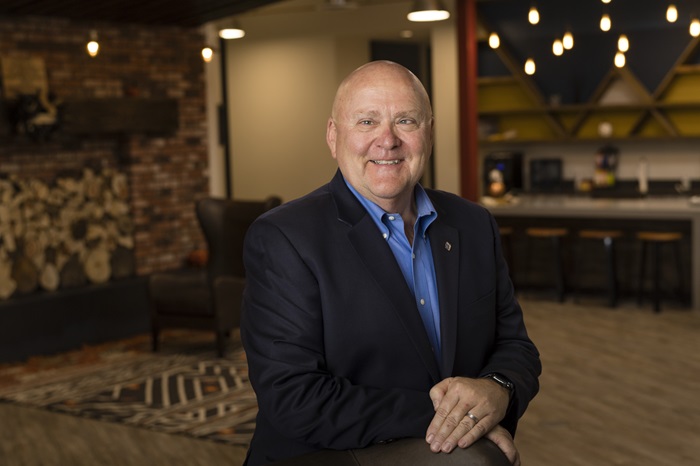Family Is the Backbone of Business: CEOs Who Support Our Most Important Institution
By Chris Benguhe, RaeAnne Marsh and Elaine Pofeldt | December 11, 2023 4:41 pm
They understand America and capitalism depend on the strength, health and future of families.

This month’s honored CEOs and business leaders realize that, as much as they want their employees to feel like they are part of a beautiful family at work and much as they might genuinely feel bonded with those individuals, they know all of us are ultimately way more bonded to our primary families. (iStock: LightFieldStudios)
In his famous book The Wealth of Nations, Adam Smith set off a firestorm of controversy with his idea that maximizing self-interest is the best route to the greatest good for all of society. Often regarded as the father of modern capitalism, he ignited a debate that still creates quite a ruckus today.
However, it is also important to realize that, in his other, lesser- known work, The Theory of Moral Sentiment, he clarifies “self-interest” as significantly more complex, involving many aspects of human nature and life that are folded into one’s self-interest. Therefore, he argues, they must be promoted for society to prosper — and not the least of these was the desire to see the betterment and fortune of others, as well as oneself.
And though he advocates for bringing that desire into every aspect of one’s life, he explains that one of the most powerful places where we can grow and serve that desire is in our own families where there is no profit motive at all, but only the yearning to love. The nurturing, strengthening and replenishing that happens in that safe space enables individuals to more competently compete and perform in the workplace, and also feel empowered to bring some of that love into the workplace. Therefore, supporting the family ultimately supports the workplace.
Pretty heady philosophical stuff, right? Not really; anybody who has ever had a domestic dispute or tough times at home knows full well how you feel when you drag yourself to work with all that hanging over you. And conversely, how productive and great you get along at work when everything is going well at home.
So maybe it just makes plain, good ol’ sense for those we work for and with to do everything they can to help us improve our home life, so we can bring our absolute best selves to work when get there.
But maybe even more importantly, if we all really do want to see the betterment of others, and family is one of the best places for us to do that, why wouldn’t a humanistic business leader want to make that happen for those who give their time, efforts and passion to building their company’s success?
This month’s honored CEOs and business leaders get that, and they are going above and beyond to not just say it but enact the kind of life-changing and sometimes life-saving policies that will help families thrive and, subsequently, humanity thrive. They realize that, as much as they want their employees to feel like they are part of a beautiful family at work and much as they might genuinely feel bonded with those individuals, they know all of us are ultimately way more bonded to our primary families. And that is the one we long to spend time with in our personal lives, wherever and whatever that is or looks like. The more time, the more support and the more happiness companies can help employees to bring into those lives and, ultimately, those families — then, the better it is for everyone in and out of business.
Tony Capuano, Marriott International
Since becoming CEO almost three years ago, Tony Capuano has not only embraced the legacy of Marriott’s founding family — which always considered “people skills” to be of the utmost value — but he has taken that Social Capital culture to the next level by learning what today’s families really want and need. That’s a big part of why family is a major focus of the way Marriott does business, and why we are honoring him.
“Since J. Willard and Alice S. Marriott founded the company nearly a century ago, Marriott International has focused on putting people first,” Tony explains. “Marriott understands the importance of family, which is why we’ve prioritized childcare, family support and wellness as core offerings for our associates.”
But as the world changes, so do the needs of the modern family. Marriott has responded by proactively listening to its associates’ feedback, which prompted the company to offer “best-in-class health and family planning benefits to meet their diverse needs.” That’s just one of the many reasons it has been honored and recognized by numerous publications and organizations such as Great Place to Work® as a top workplace for parents.
Add to that Marriott’s relentless focus on promoting work/life balance and providing travel discounts and benefits so, as Tony kindly states, “our associates can enjoy special moments with their loved ones,” which demonstrates a company and a leader that values and respects the overall health of its employees, and realizes that is at the core of its success.
Declares Tony, “We have a deep belief that our associates are the heart of our company and take pride in providing tools and resources — both personally and professionally — that focus on the physical, mental and financial well-being of our global workforce.”
Penny Pennington, Edward Jones
“Edward Jones is a partnership, meaning the firm is owned by associates and we are all in this together,” declares Penny Pennington. “We know the partnership is good for all of us because there are no competing interests.”
However, it is Penny herself, as the company’s managing partner, who is responsible for the firm’s strategic direction, working together with more than 49,000 associates across North America to make a positive impact in the lives of Edward Jones’ clients, colleagues and communities. And under her leadership, Edward Jones is especially known for tempering long work hours with rewards that help employees relax and have fun — with their own family.
“We are receptive to the ideas and suggestions of all of our associates and understand that the pandemic and shift to hybrid work served as an opportunity for many people to re-evaluate what’s most important to them. And for a lot of people, family is more important than it’s ever been,” explains Penny. “Our team takes great care — and thoughtfully considers associate feedback — in providing options that offer choice and flexibility for our colleagues and their families.”
The resultant policies mean the company offers full-time associates “a comprehensive and affordable suite of benefits that supports them and their family’s well-being, limits their financial exposure and gives them control over how they spend their health care dollars.”
That includes an impressive parental leave program, which offers 16 weeks of full salary for primary caregivers and two weeks for secondary caregivers, wellness seminars and enhanced mental health resources, as well as resources to help families manage daily challenges, like their Employee Assistance Program, tuition reimbursement, and discounts on tutoring services.
A decades-long tradition and event for Edward Jones’ financial advisors and their families that Penny is particularly proud of is a multi-day summer regional meeting for each of the company’s 328 regions across North America. “The experience is part pep rally, part business meeting, and part family reunion,” Penny proudly states. “Because families are included in everything we do, the multi-generational opportunity to bond with and learn alongside one another is a hallmark of our culture.”
Though a substantial portion of its workforce operates out of the company’s 15,000 branch offices, many of which are staffed with just two or three people, home-office locations in headquarters cities continue to operate in a flexible work model, empowering associates and leaders to determine the right flexible work arrangement that balances the needs of business, team and individual.
“We recognize that the foundation of our success is our people,” Penny says. “That includes the people we serve, the people we serve alongside, and the people who support us at home. Having the love and encouragement that our families provide is important to everything we do — our associates’ families are, by extension, a part of the Edward Jones family.”
Penny, thanks for being the ultimate representation of a family-friendly, Social Capital leader!

“We only get one family, and no matter what is going on at work or in the world I also tell the team, ‘family first.’” – Trent Griffin-Braaf (Pixabay: ArtsyBee)
Chris Todd, UKG
“We recognize the word ‘family’ can mean something different to every individual,” says UKG CEO Chris Todd, explaining it can mean caring for a child, being the caretaker for an elderly parent, caring for a pet who is a beloved family member — or all these scenarios and more. “That’s why we design our benefits programs to be inclusive, well-rounded, equitable, and supportive of every person and every scenario, to ensure we’re supporting our people — and their families — in every instance along the way.”
Chris notes UKG is always evolving its benefits, programs and policies to meet its employees’ evolving needs — and the needs of their families, however they define them. This makes UKG a model Social Capital company for us, and is why we are so happy to honor Chris and his company. In fact, one of UKG’s newest employee resource groups, NEST, focuses on helping parents and caregivers to thrive.
“We hear directly from our employees often, with feedback on how our benefits have helped them in their lives,” Chris shares, “and we also directly solicit feedback in the form of pulse surveys, in addition to our biannual global employee-experience survey.” An illustration of how that works is the detailed total rewards survey sent earlier this year to a random sample of UKG’s global employee population, to learn more about which programs and benefits resonate most. “From that survey, our employees made it clear that total rewards are extremely important, with nearly 80% saying that our total rewards programs motivate them to do their best work. So, we used this feedback — and the feedback we receive throughout the year — to adjust our programs as necessary to ensure we’re best serving our people, their families, and our business.”
Another example of how UKG evolved its benefits this year based on employee feedback is its new global equitable benefits program called U Choose, which launched in January this year. “We’d heard from employees that some people felt many of our benefits programs were geared too much toward specific groups, like families, and our employees without children or spouses felt left out. We also were aware that some of our benefits, like student loan repayment assistance, could not be offered equitably in every country where we had employees.” U Choose is designed to make benefits more equitable and give the power of choice to U Krewers. Employees now receive funds each quarter for more than 150 different life expenses, from family-focused expenses like childcare, kids’ extracurriculars and pet care, to individual expenses like student loan repayment and personal wellness or lifestyle activities — including athletic shoes! “We’ve received much positive feedback from the program, and we had a very successful early adoption rate,” says Chris, relating that more than 800 claims were filed in the first 24 hours alone, with more than 3,200 pairs of athletic shoes purchased in the first quarter! “We continue to expand the program and items/expenses covered, based on the feedback we’re receiving directly from our employees.”
In fact, he emphasizes, “We continue to invest in the benefits that allow us to care for our employees wholeheartedly.” One of the premier UKG benefits is its 100%-company-paid healthcare premiums (medical, dental and vision) for the majority of employees and their families, and Chris notes UKG is above the market in terms of offering plans without premiums, as only about 1% of companies of its size offer healthcare plans without premiums.
Among a suite of new benefits added this year or coming up next year is increasing UKG Paid Leave used to take care of families, from four weeks to six weeks fully paid, which will now also include qualified domestic partners; and extending gender-affirming care coverage that was previously available only in the U.S. and India to all employees globally — a result Chris credits to “listening attentively and working with our PRIDE employee resource group for our LGBTQIA+ community and their allies.”
And then there’s UKG’s PeopleInspired Giving Foundation, a 501(c)(3) dedicated to providing financial assistance to UKG employees and their families who are physically, economically, emotionally or otherwise adversely impacted by tragedy. “Many employees around the world have thankfully used this foundation to receive financial support during trying times,” Chris shares. Since launching this foundation in May 2020, UKG has provided more than $500,000 in direct support to its employees and their families.
Reiterating that UKG does not define “family” in any one specific way, Chris says the company’s main goal — and his main priority as its CEO — is to support and care for every one of the more than 15,000 U Krewers and the people they consider family. “Our purpose is people, and we strive every day to exemplify that purpose through the ways we take care of our people across the world.”
And as if that’s not Social Capital-esque enough, Chris also shares his belief that UKG’s mission as a company is to inspire every organization to become a great place to work through technology built for all. “Every day, we provide HR, payroll and workforce management solutions that help organizations achieve that goal — and, hopefully, create a people-first culture at their own companies. That’s our purpose at UKG, and we hope we can help people all around the world find their purpose at work.”
Jasmine Jirele, Allianz Life Insurance Company of North America
When it comes to family-friendly benefits, Allianz — in true Social Capital spirit — embraces the idea that each employee’s needs are unique and constantly evolving and accepts from its team abundant input into shaping the company’s benefits.
Under the leadership of president and CEO Jasmine Jirele, Allianz’s benefits address every stage of workers’ lives. There is expanded maternity leave, parental/bonding leave, and adoption leave for all families, as well as a support program for employees grieving a miscarriage or death of a child or grandchild at any age. The Allianz Adoption and Surrogacy Assistance Reimbursement Program provides financial assistance to employees for both the adoption of children under 18 years of age and surrogacy expenses. Meanwhile, support for caregivers comes through a third-party vendor that offers personalized coaching, curated resources and live phone/video calls.
Giving employees a say in when and where they work is part of helping them to live balanced lives, and team members at Allianz can opt to “work from anywhere” for one month each year. Wellness, in all its forms, is a critical cornerstone as well. Allianz’s team can tap into a “Lifestyle Account” that provides employees with up to $500 reimbursement for expenses related to fitness club memberships, childcare, financial planning and more. In 2020, Allianz also opened an onsite health clinic for all benefits-eligible employees and their dependents, six weeks and older. It provides sick and urgent care, physical and sports exams, chronic condition management, mental health services and more to both employees and their families from a location right next door to its onsite childcare center.
At Allianz, the definition of family is very broad, reflecting the realities of team members’ lives. “One thing I’ve always been very proud of at Allianz Life is our inclusive culture,” says Jasmine. “That not only includes our employees, but their families and lives outside of work. As such, our benefits are inclusive for all — that includes same- and different-sex spousal and domestic partner benefits. We want to make sure all our families — no matter who is part of them — are taken care of. Caring for the caregivers themselves is also critical, which is why our benefits include caregiver support services.”
With families’ needs evolving rapidly, Allianz makes sure its policies reflect frequent input from its people, surveying employees annually about what benefits will help them and their families the most. The insurance giant also seeks feedback on benefit changes from its “Eagle’s Cabinet,” a group of 10 employees who advise executive leadership on critical employee and culture issues. “We do this to not only keep a pulse on what it is our employees need, but to also make sure we are adapting to take care of all employees and their families,” Jasmine says.
Jasmine understands the importance of family-friendly benefits not just as a leader but as a parent in the sandwich generation herself. “As the working mother of a 12-year-old, I’ve had to learn how to juggle family and business needs,” Jasmine says. “At the same time, I’ve had elder-care responsibilities to manage, and I appreciate the value of the benefits and the flexibility the company has afforded me. I think employees are more engaged and do better work when they have the resources to focus on caring for their families. Also, needs change over time, so benefits have to be flexible to support changing needs.”

“Our purpose is people, and we strive every day to exemplify that purpose through the ways we take care of our people across the world.” – Chris Todd (iStock: Rawpixel)
Trent Griffin-Braaf, Tech Valley Shuttle
Family-friendly policies were part of plan from the outset for Trent Griffin-Braaf, who founded Tech Valley Shuttle Albany, N.Y., in 2016. His success in building that culture into his company is reflected by awards such as the Best Places to Work by The Albany Business Review that the company received earlier this year.
And these policies, he explains, are informed by his own real, lived experiences as well as those of his team members. “It starts with a common quote I can be heard saying at the office that family is first!,” he says. “We only get one family, and no matter what is going on at work or in the world I also tell the team, ‘family first.’ The team knows whenever they have something going on with themselves or family members, I’m going to tell them [to] stop what they’re doing and go take care of themselves and/or family.”
Trent shares that, when his now-teenaged daughter was three years old, she caught meningitis which spread to her brain. She was hospitalized for more than 40 days, and Trent spent every day with her. “During that time work didn’t matter to me,” he relates. “That experience lives with me still, and my company reflects that with our family-first model.”
Nor does the company set limits on what is “family.” Observing that blood is not the only defining factor, Trent says the company never questions team members’ definition of family. “If someone says they have a family emergency, we honor that no matter if that ‘family’ member is a close friend or a sibling. We don’t believe it’s our responsibility to police who our team defines as family.”
Trent’s regard for his employees is mirrored back to him. It is worth noting that being chosen as a Best Places to Work is based on anonymous employee surveys where employees rank a variety of job factors that influence employee engagement and satisfaction. With the highest score a company can get being a 100, Tech Valley Shuttle achieved a remarkable Best Place to Work score of 96.91, a testament to the company’s commitment to providing a supportive and engaging work environment. Employee feedback via anonymous surveys revealed 100% of staff were fully engaged and motivated in their roles.
Creating employment opportunity, itself, is also a core element of Trent’s business model, as he explains, “We offer commuter benefits to our team members to remove the barrier around access to employment via lack of reliable and affordable transportation to and from work.”
Other employment benefits include flexible work arrangements for team members, a wellness program that supports their physical as well as mental well-being, and partnerships with community agencies (EOC, ACAP) and colleges (Bryant and Stratton, HVCC) to aid their individual development. “And we don’t just support their goals that can benefit us at Tech Valley Shuttle,” Trent says. “We invest in whatever our team members’ long-term goals are.”
Trent has created an exemplary model of a business that celebrates Social Capital, and we are pleased to honor him as a Social Capital CEO.
Joe Ucuzoglu, Deloitte Global
Contrary to the stereotype of giant corporations having a less-than-caring approach to their employees’ personal lives, Deloitte demonstrates a giant heart for families. Much to the credit of its altruistic-minded CEO, Joe Ucuzoglu.
Deloitte is one of the world’s largest professional services organizations, which provides audit, advisory, tax and consulting services. And year after year, Deloitte has been honored by family-focused publications like Working Mother and Parenting as a top company to work at. That’s because it offers an incredibly vast and generous family-friendly culture that runs that reaches into so many levels of the work environment, from alternative schedules and remote jobs to an incredible maternity leave program that provides up to 16 weeks off to bond with a birthed or adopted child, as well as a similar benefit to care for a family member who is seriously ill. Worth noting is the stated policy that “fathers, sons, husbands and brothers can take the leave, relieving the often-seen cultural pressure on women to be the default caregiver.”
Generous reimbursement for adoption and surrogacy is among a plethora of employee benefits in the company’s “starting a family” category. And for established families, Deloitte also offers emergency back-up dependent care and family support services.
An accepting attitude of personal family issues and concerns makes it abundantly clear that Deloitte believes your family is the most important part of your life, and they want to do everything they can to support that. In fact, Glassdoor, which uses actual employee feedback to evaluate businesses, shows ratings of above 4 stars out of 5 possible on family-related attributes that include maternity and paternity leave and dependent care.
Why do business this way? Well, if there is one big reason for it, it’s the deeply devoted beliefs of its CEO who believes wholeheartedly in our Social Capital approach to doing business.
“If we embrace the obligation to serve a broad cross-section of constituents, we do right by our employees, we do right by the communities where we live and work. By virtue of doing right by those constituents, profits will be an outcome, not the initial or primary objective,” Joe declares, “They’re a natural long-term outcome.”
All in all, it comes back to his belief, and ours, that people are the point of profits and not the other way around. And he believes wholeheartedly, like we do, that this philosophy is authentic, effective and will win out over archaic bottom-line thinking.
“On one end, there’s some skepticism as to whether this is virtue signaling,” Joe explains. “On the other end, there’s some lingering debate about whether this broader focus on stakeholders detracts from shareholder returns. If you cut through all the noise, what we’re seeing is actually a huge convergence of interests. This is core to sustaining a vibrant capitalist system. If you take a long-term view, the only way that you’re going to deliver sustainable shareholder returns is to take really good care of all of those constituents.”

“At Hewlett Packard Enterprise, we are only as successful as our people.” -Antonio Neri (iStock: LightFieldStudios)
Antonio Neri, Hewlett Packard Enterprise Company
Hewlett Packard Enterprise provides technology solutions that help customers rebuild and reshape their business and operational models in order to increase performance. But it’s for how it helps families with its operational model and performance that we are honoring it as a Social Capital leader.
With the company’s paid parental leave program offering up to a whopping 26weeksand up to 36 months to transition back to full time after a child is born, it’s no wonder employees are big fans. HPE’s incredibly family-friendly policy pays 100% of an employee’s salary and is available to both mothers and fathers. The company even allows new parents to work part time for up to three years afterward as they transition back to work. That’s how much the company values its employees and their dedication to their families.
It’s the kind of thing that dreams are made of for new parents, but it’s an everyday reality for the more than 60,000 HPE employees that is just one part of the company’s “Work That Fits Your Life” program initiative designed to enrich the personal well-being and work/life balance of its employees through workplace flexibility, family leave and very helpful return to work options.
Any employee who has been at HPE for a year is eligible for the leave, which can be taken at any time within the first 12 months after the birth or adoption of a child. And a breastfeeding support program and milk shipping service helps moms balance caring for a baby while returning to work.
Then, when the parent is ready to return, HPE’s “Parental Transition Support” offers a flexible work arrangement policy that allows new parents the opportunity — as mentioned above — to work part time for up to 36 months after their child’s arrival. That’s three years of family flexibility! Plus, families get up to 10 days a year for free backup care for every child, adult or elder loved one.
Another big family favorite is “Wellness Fridays,” which allows employees to leave work three paid hours early one Friday a month, plus a program called “Career Reboot,” which offers job opportunities and training for employees who put their careers on hold for a while to raise a child. Further, employees’ children can tap into free homework help and test prep.
Financial wellness benefits are a cornerstone in HPE’s benefits program, with an employee stock purchase plan, a generous 401(k) match, access to a financial counselor, a company contribution of up to $1,000 to employees’ health savings accounts and tuition reimbursement of up to $9,000 of student loans.
HPE values its team members’ commitment to their communities. Every employee is eligible for up to 60 hours of paid time off to volunteer.
And for HPE’s president and CEO Antonio Neri, all of it is part of an overall respect and push for inclusivity for all employees.
“At Hewlett Packard Enterprise, we are only as successful as our people,” Antonio says. “That’s why we put them first and care so deeply about fostering a workplace that is unconditionally inclusive, extending all team members an equal opportunity to succeed with a sense of belonging.”
Chuck Robbins, Cisco
Cisco CEO Chuck Robbins’ belief in the bonds of family led him to speak out publicly in 2018 against the family separations being forced at the United States’ southern border — seeing it as a moral issue, not a political one. Not surprisingly, then, valuing family permeates the employee policies throughout the company he leads.
“We champion every family,” the company website proudly declares. “Every family has a unique story — and we have benefits to support them all.”
For starters, there’s paid time off to bond with a new child that is dependent not on gender but on the employee’s care-giving role. Even grandparents are eligible if they are the primary caretaker for the child.
It’s what Cisco calls “Our People Deal,” and rather than a cookie-cutter approach, the amount of time off depends on whether the employee functions in a main or supporting caregiver role. The company provides a minimum of 13 weeks of paid time off for the main caregiver, although it may be longer. For a supporting caregiver, the company provides four paid weeks, to be taken within the first six months of the child’s birth or adoption. Even grandparenthood is recognized as an exciting milestone, and Cisco grandparents can take up to three paid days off within one year of the arrival of a new grandchild.
Then there is $20,000 in financial assistance for adoption and surrogacy per child, and up to US$50,000 for family-planning expenses.
Support for parents of children with developmental disabilities comes through Rethink, a program to support Cisco parents of children with learning, social or behavioral challenges, or a developmental disability such as autism, Down syndrome or ADHD.
But the company’s support of families doesn’t stop there but continues throughout the life process with on-site children’s learning centers. And back-up caregiver support is available at affordable rates for children and adults — even if their relative doesn’t live with them. As the website puts it, “We provide parenting solutions from diapers to diplomas.”
Cisco also offers support for employees caring for a loved one who has suffered an accident or health issue, and for employees who are assisting aging relatives.
And you say it’s your birthday? All employees can take a paid day off within 10 days of their birthday to celebrate with their loved one.
Finally, Cisco’s Critical Time Off programs allow employees dealing with a death, illness or a natural disaster in their family to take care of the business of their families, allowing them to take time off at full pay without using their regular paid time off. And this benefit is extended to help “family” — which is defined as anyone that employee “might rely on or who rely on them, so they can be there for the people closest to them.”
It’s Social Capital at a very fundamental level, and we are pleased to honor Chuck as a Social Capital CEO for supporting the value of family. His company’s website says it well: “We understand that our employees are also parents, colleagues and community members. We make it easier for our people to support and help the people they love.”

“My chief assets drive out the gate every day. My job is to make sure they come back.” – Jim Goodnight (iStock: Jacob Wackerhausen)
Jim Goodnight, SAS
The culture of SAS honors the importance of family, work/life balance and enjoyment of the workplace, and its amazingly extensive and varied menu of perks for employees serves as constant affirmation of how much they are valued at this software analytics company.
And they return that favor to the company with their loyalty. SAS’s turnover rate is one-tenth of the industry average of above 16%. With the cost of turnover a tremendous financial loss to businesses, those statistics alone are concrete proof of the value of Social Capital. SAS is committed to helping employees, their families and retirees achieve balance in their lives by providing problem-solving, coaching, resources and referrals, and educational programs.
So, it is no wonder why ultra-practical CEO and co-founder Jim Goodnight says the policies make estimable business sense as well. “My chief assets drive out the gate every day,” Jim says. “My job is to make sure they come back.”
And they do. The SAS employee sticks around for 10 years, compared to an industry average of four, and about 300 employees have worked 25 or more.
A few of their most-loved perks include generous vacation and volunteer time off. SAS starts employees with three weeks of vacation, plus an extra week off for winter break at the end of each year so they have plenty of time to celebrate with their family. Unlimited sick days, paid maternity and paternity leave plus adoption assistance and tuition assistance add to the overall appeal.
But that’s not all — not by a long shot. College-bound kids of employees at this analytics software company can take advantage of a scholarship program. The campus is home to a 56-person onsite primary care center and a pharmacy for employees and their families. There’s also a recreation and fitness facility — including family swim days and virtual interactive kid-friendly events. SAS even has a summer camp for school-age children. A work/life center offers resources and counseling on topics like parenting both new babies and teens about to go to college. Subsidized childcare and elder care round out the family-friendly perks.
The company has received considerable recognition for being a great place to work — including a ranking as a Great Place to Work Legend with a place on the U.S. list every year. We believe that creating a work environment like this has a trickle-down effect when employees go home to their families.
SAS provides innovative software and service to empower its customers to transform data into intelligence, and its founder, Jim Goodnight, was one of the first business leaders to practice what we are now spotlighting as Social Capital since co-founding the company back in 1976. Goodnight believes that “what makes my organization work are the new ideas that come out of my employees’ brains,” and, operating from that conviction, he both respects his employees and cares about their happiness.
He consistently nurtures SAS’s corporate culture of trust, believing that workers who consistently respect the organization’s management will put forth their greatest commitment and contribution. And it is not a top-down approach to running the company, as feedback is solicited from employees to ensure SAS maintains that high level of trust — and also on how they are being treated as human beings.
Building into the corporate leadership this regard for people as people, only those who demonstrate a natural inclination to support and help people are considered for any management position. In fact, SAS operates from the belief that the primary responsibility of its leaders is to facilitate the career success of other employees, not their own.
Robert B. Ford, Abbott Laboratories
President and CEO Robert Ford has been with Abbott for more than 20 years, and, during his tenure there, the company has created a benefit structure for its 115, 000 employees working around the world so supportive of family that it’s almost too much to talk about. But don’t worry — we won’t let that stop us.
Most of us may be familiar with the many incredible lifesaving and life-changing medical products Abbott makes to improve our lives. In its own words, its “purpose is to make the world a better place by bringing life-changing health technologies to the people who need them. That’s our commitment to helping you live your best life.”
That objective on its own would put Abbott up on our radar screen for potentially honoring Robert as a Social Capital leader. But what few people realize, and we didn’t either until we did some research, is that Abbott is taking that same approach to how it takes care of its employees’ and their families’ health and happiness.
Abbott’s parental leave is available to eligible birth and adoptive mothers and fathers, providing up to eight workweeks paid time off following the birth or legal adoption of a child.
And looking to adopt — Abbott reimburses up to $20,000 for eligible related expenses.
Employees receive complimentary Care.com premium membership, which helps to find and manage care for children, seniors, pets and the home. This includes 24/7 live access to free Care Specialists offering one-on-one personalized support; preferred placement and fee discounts with national and regional childcare providers; free breast milk delivery for nursing Abbott employees traveling on business; free virtual, on-demand tutoring services, resources and support for parents of neurodiverse children; and education support that includes college advisory services.
Looking to ease into that family or help out another one, Abbott provides eligible employees financial assistance to help with the cost of fostering a child with a disbursement of $1,000 per household (up to five allowed) per calendar year for a new formal foster-care placement in the employee’s home.
Rounding out those amazing family benefits are elder care patient advocacy, care coordination and caregiving support services.
Plus, in addition to its top-notch medical and dental benefits, Abbott offers seminars on stress and anxiety, personal and work relationships, meditation and mindfulness, healthy habits, and balancing work and family needs. That includes programs to improve and encourage being physically active, eating healthier, managing challenging health conditions, getting better-quality sleep, and becoming more resilient, all of which are goals that any parent knows all too well can be difficult to achieve.
If an employee needs to take time off from work, due either to a serious illness (after sick-pay benefits have been exhausted) or to care for a newborn or a parent, spouse or child who becomes seriously ill, the company’s Family Medical Leave Act of 1993 provides up to 12 weeks of unpaid, job-protected leave in a 12-month period.
Finally tying it all together in an incredibly compassionate and humanistic way is Abbott’s Employee Assistance Program. This free, confidential program provides assistance, support and easy access to therapy on a range of personal concerns, among which are assessment and coordination for care that includes therapy, online wellness exercises, coaching, specialized care for substance use disorders and more. EAP counselors also work with managers and supervisors to provide crisis intervention and educational/training sessions.
Need we say more?




